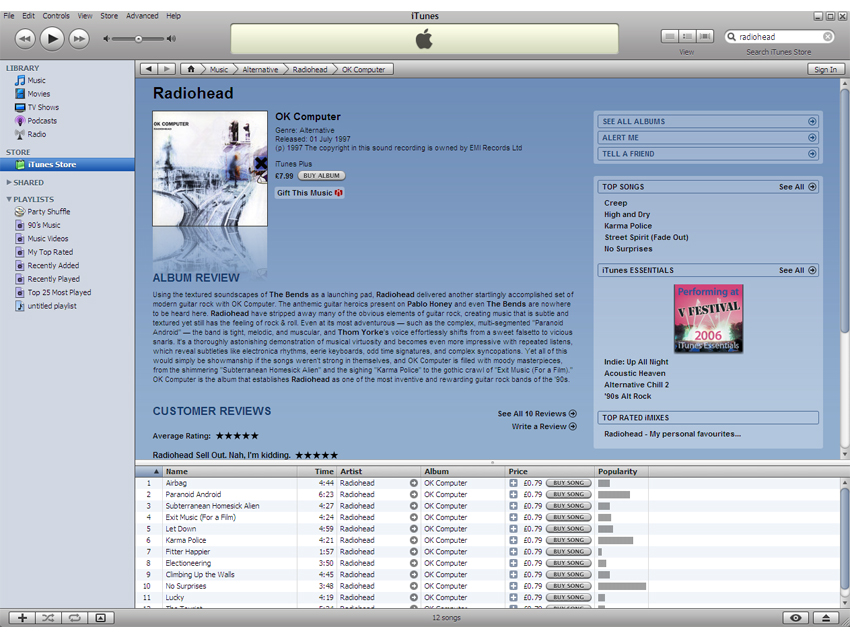BLOG: The end of the album?
Is Radiohead's iTunes decision a turning point?

By finally allowing their back catalogue to be put on iTunes, Radiohead have tacitly admitted defeated in their battle to see their albums recognised as bodies of work rather than collections of songs. Now, anyone who visits Apple´s Music Store can pick and choose the Radiohead tracks they want and listen to them out of their original context.
Leaving aside the futility of the band´s previous stance - we´ve all got skip buttons, after all - you could argue that Radiohead´s decision marks another step on the traditional album´s journey towards obsolescence. Isn´t it true that, these days, it´s all about songs?
Smashing Pumpkins certainly think so; drummer Jimmy Chamberlin announced earlier this year that Zeitgeist, the band´s most recent album, will be their last. Irish rockers Ash have made a similar commitment, and those bastions of bombast Muse are also considering alternative ways to release their music.
It´s ironic that, at a time when sales of physical singles are falling through the floor -in fact, the CD single is all but dead in many territories - the importance of creating songs that stand up to scrutiny when they´re listened to in isolation has never been higher.
A one-track world
Increasingly, music fans are sampling new bands on blogs and MySpace pages - artists can no longer control what´s being listened to by drip-feeding tracks to radio. They may hope that people will buy albums in their entirety, but these days, it´s more likely that they´ll download just the tracks they want to hear.
So the balance of power has shifted - the editing process is now in the hands of fans rather than bands - but I don´t think it necessarily follows that the traditional album is doomed.
Get the MusicRadar Newsletter
Want all the hottest music and gear news, reviews, deals, features and more, direct to your inbox? Sign up here.
Increasingly, artists whose albums feature ten random songs will find that listeners will devour their material in bite-sized chunks, but those who can demonstrate that they´ve produced a coherent set will reap the reward of full-length sales.
Musicians will have to pick the model that suits them best. There´s little doubt that, despite acquiescing to Steve Jobs´ demands, Radiohead will remain an albums band, but other artists may have to think again about how they release their material.
By Ben Rogerson

I’m the Deputy Editor of MusicRadar, having worked on the site since its launch in 2007. I previously spent eight years working on our sister magazine, Computer Music. I’ve been playing the piano, gigging in bands and failing to finish tracks at home for more than 30 years, 24 of which I’ve also spent writing about music and the ever-changing technology used to make it.
"At first the tension was unbelievable. Johnny was really cold, Dee Dee was OK but Joey was a sweetheart": The story of the Ramones' recording of Baby I Love You
"Reggae is more freeform than the blues. But more important, reggae is for everyone": Bob Marley and the Wailers' Catch a Fire, track-by-track









